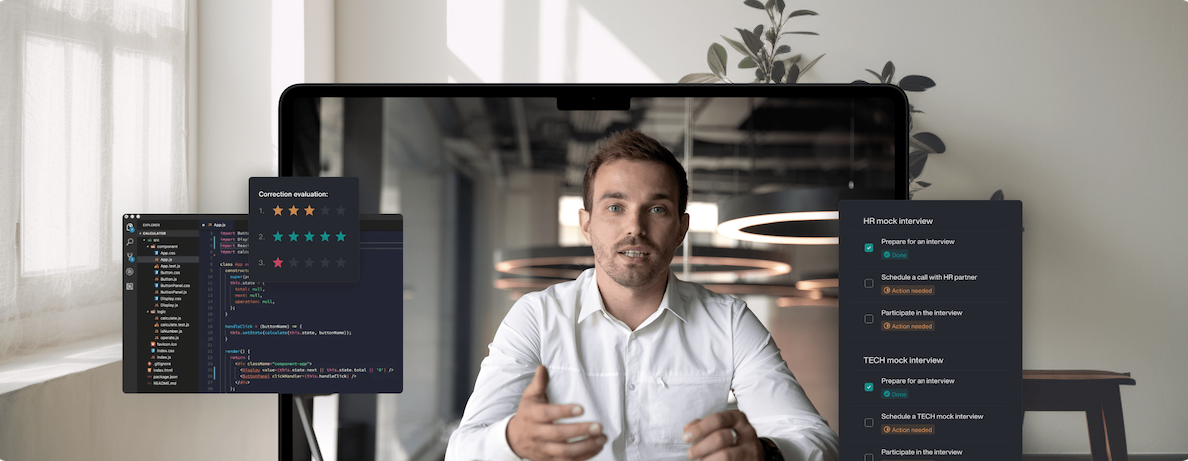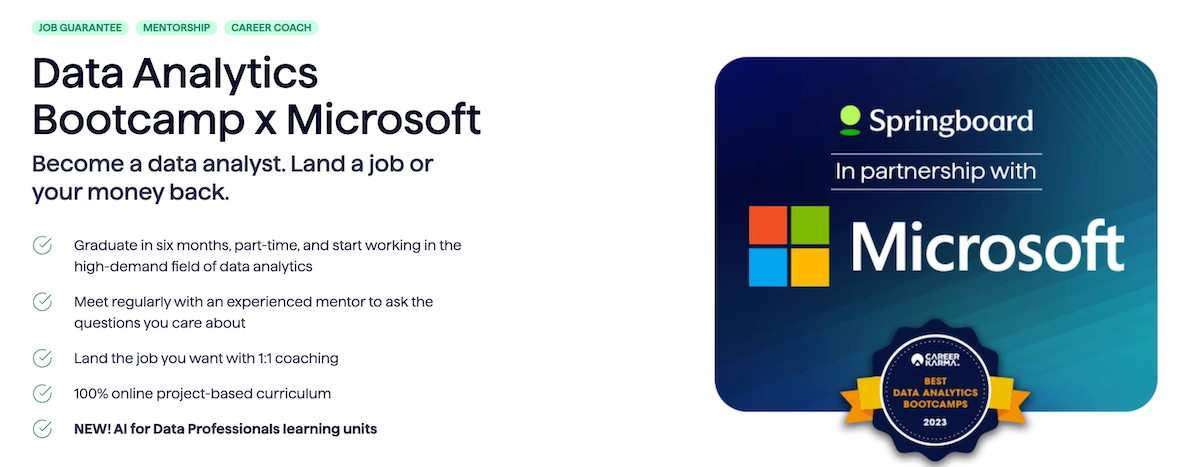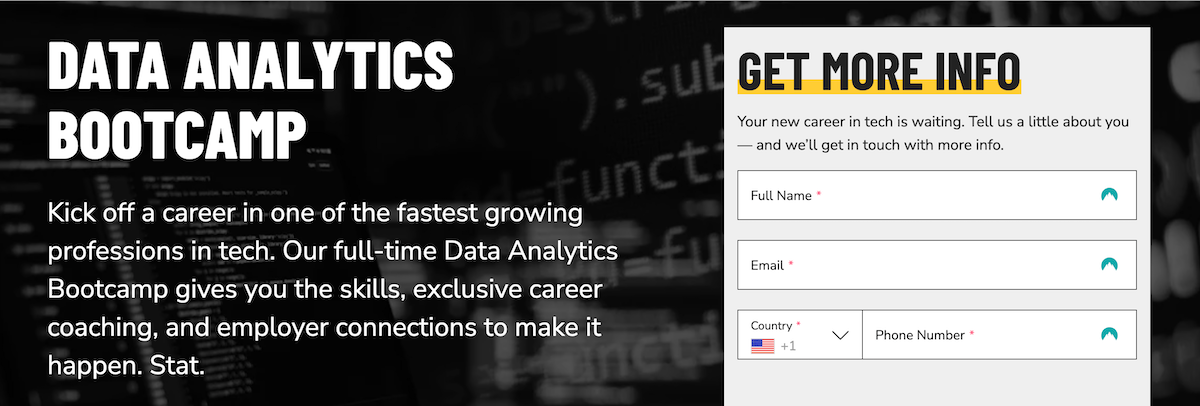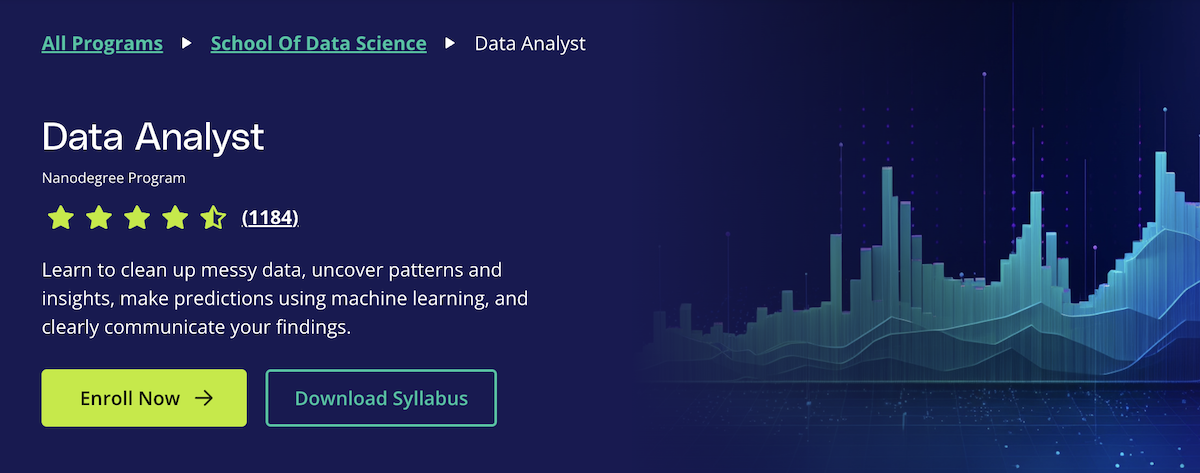Best Data Analytics Courses for a Career Change in 2024
Discover the top online data analytics certification programs of 2024 that can help you break into this lucrative field. We'll provide an in-depth analysis of the best courses available, empowering you to make an informed decision and jumpstart your career in data analytics.

In a world where data reigns supreme, a data analyst career could be your golden ticket. Many professionals from various backgrounds take online courses to reskill in data analytics. But with so many courses available out there, you’ll want to know: What are the top data analytics certification programs to consider in 2024? In this article, we'll break down the top online data analytics courses and arm you with the information you need to make a confident decision.
Considerations When Choosing a Data Analytics Course
Selecting the best program for your career as a data analyst is a big decision, so you want to make a choice that will truly pay off. Not all courses are created equal, so it's crucial to evaluate your options carefully based on a few key factors.
Course Content and Curriculum
First and foremost, take a close look at the program content and curriculum. A high-quality data analytics course should cover all the essential skills you'll need in the data analyst job, from data processing and visualization to regressions and Python programming. Make sure the syllabus aligns with your goals and the demands of the industry.
Current Skill Level and Prerequisites
It's also important to be honest with yourself about your current skill level and any previous experience the course may require. Some online courses are designed for beginners with no relevant degree or experience, while others assume a certain level of prior knowledge. Be realistic about where you're starting from and choose a program that meets you where you are.
Learning Style and Format Preferences
Next, think about your learning style and format preferences. Do you thrive in a structured setting, or do you prefer self-paced online learning? Look for a data analytics course that offers the right mix of lectures, hands-on exercises, and independent study to keep you motivated.
Hands-on Learning Opportunities and Projects
Secondly, prioritize courses that offer ample opportunities for hands-on learning and practical projects. There's no substitute for trying your hand at real data sets. The more chances you have to apply your new data skills, the better prepared you'll be for the challenges of a data analytics career. Look for programs that incorporate case studies, capstone projects, and portfolio-building exercises.
Mentorship and Career Guidance
Another important consideration is the level of mentorship and career guidance provided. Learning technical data analysis skills is just one piece of the puzzle. You also need to know how to navigate the job market and showcase your abilities to potential employers.
The best programs for beginner data analysts include one-on-one mentorship from experienced professionals who can offer personalized advice and support. Some programs even come with career coaching to help you land your dream role.
Pricing and Time Commitment
Finally, be sure to factor in the pricing and time commitment required. Data analytics courses can vary widely in cost and duration, from short courses to multi-month programs. Be realistic about your budget and schedule, but also remember that investing in your education is investing in your future. Don't be afraid to stretch yourself if it means gaining the skills and credentials you need to succeed.
Essential Skills for a Beginner Data Analyst
When you invest your time and energy into getting your data analyst certification, you want to learn all the key skills to succeed in the field. That's why it's so important to choose a course that covers all the key bases, from data collection to business intelligence.
Data Collection and Preprocessing
This is the bread and butter of data analytics: gathering raw data from various sources, cleaning it up, and getting it ready for analysis. It might not be the most glamorous part of the process, but it's absolutely essential. Without high-quality data, all the advanced data modeling techniques in the world won't do you much good.
Statistical Analysis and Modeling
This is where you'll learn how to use data analytics to uncover patterns, make predictions, and turn data into meaningful insights. From basic customer segmentation to logistic regression models, a good data analyst needs a solid foundation in the methods that matter most.
Data Visualization and Communication
Analyzing the data is only half the battle. To really make an impact, you need to be able to communicate your findings effectively. That's where the importance of visualizing data comes in. In a top-notch data analytics program, you'll learn to create visualizations that bring your insights to life and tell a story. You'll also hone your skills in presenting your findings to stakeholders and translating technical data analytics concepts into business-relevant terms.
Programming Languages
Python and R are the most popular languages in data analytics, and for good reason. They're powerful and flexible and have huge ecosystems of libraries and analytics tools. A good course will teach you the basics of programming and equip you with the skills you need to wrangle data, build models, and automate your workflows.
Business Intelligence Tools
Finally, note the importance of business intelligence tools. Platforms like Tableau and Power BI are essential for creating interactive dashboards, exploring data visually, and sharing insights across an organization. Many courses, even for beginner data analysts, now include training in these tools, giving you a valuable skill set.
Best Data Analytics Courses
Turing College Data Analytics Program

Who is it for?
The Turing College Data Analytics program is designed for people looking to learn the skills necessary to become data analysts. It is suitable both for beginners and for those with some background in data analysis who want to formalize their skills.
The program is fully online and self-paced, making it a good fit for working professionals, students, or anyone who needs flexibility in their learning schedule.
How does it work?
Turing College's program combines video lessons, readings, quizzes, hands-on projects, and career support. Learners go through the theoretical part and then apply their skills in practical exercises. One-on-one mentoring provides guidance throughout the course. Turing College places a lot of focus on community-oriented learning models, which allow learners to ask questions, share insights, and collaborate with peers. Discussion forums allow flexible interaction with instructors and peers.
The program is project-based, focusing on practical skills and allowing learners to get a good picture of how data analysts work in real life. Turing College also offers career support, including resume and LinkedIn profile reviews, mock interviews, and job search strategies.
Curriculum details
Turing College's data analytics curriculum emphasizes practical, job-ready skills:
- Fundamentals of data analytics
- Excel or Google Sheets for data analysis
- SQL and databases
- Data visualization with business intelligence tools
- Storytelling and presentation skills
- Main analysis types and how they relate to customer behavior, e-commerce, customer value, and modeling
- Retention, cohort, RFM, and CLV analysis
- Funnels and A/B testing
- Linear and logistic regression
The program also includes optional modules, where learners can choose between six specializations. These include product analysis, marketing analysis, payments/monetization analysis, financial analysis, risk analysis, and Python programming. A capstone project allows learners to create a unique portfolio piece, which they can showcase to potential employers.
Duration
The program is self-paced and can be completed in 6-12 months with a commitment of 15-20 hours per week.
Cost
Tuition is €6,480 ($7,030) when paid upfront, with monthly payment plans available as well. EU residents can apply for 100% scholarships.
Springboard Data Analytics Career Track

Who is it for?
The Springboard program is designed for people who want to transition into data analytics. Note that it requires strong critical thinking and problem-solving skills as well as 2+ years of professional experience, and may not be suitable for beginners.
How does it work?
Springboard's program combines self-paced learning with one-on-one mentorship. Students work through the curriculum independently, completing video lessons, articles, and hands-on projects. Weekly mentor calls provide guidance, feedback, and accountability.
The project-based curriculum allows students to build a professional portfolio demonstrating their data analytics skills. Springboard also offers career coaching to help students navigate the job search process.
Curriculum details
The program covers the following key topics:
- Introduction to data analytics principles
- Excel skills for data analytics
- Financial analysis
- Economics and statistics
- Data visualization tools and storytelling
- Data connectivity
- Python for data analysis
The program includes over 500 hours of coursework, strongly emphasizing hands-on projects using real-world datasets. Students complete two capstone projects, showcasing their ability to work through the entire data analysis process, from data wrangling to insights.
Duration
The program takes six months to complete at 15-20 hours per week.
Cost
The program costs $8,500 when paid upfront, with monthly payment plans also available.
General Assembly Data Analytics Bootcamp

Who is it for?
General Assembly's Data Analytics Bootcamp requires no prior experience in data analytics, making it suitable for beginners. However, General Assembly recommends that applicants have a basic understanding of statistics and some exposure to Excel or other spreadsheet tools.
How does it work?
The Data Analytics Bootcamp is an immersive, full-time program that combines live online classes with self-paced learning. Students attend live lectures and workshops led by expert instructors, work on individual and group projects, and receive support from instructional associates and classmates.The curriculum is project-based, providing hands-on experience with real-world datasets. Students build a portfolio of projects demonstrating their data skills to potential employers. General Assembly also offers career support, including resume reviews, interview preparation, and networking opportunities.
Curriculum details
The bootcamp syllabus includes the following key topics:
- Data acquisition and cleaning with SQL
- Tableau
- Python
- Power BI
- Statistics and math for data analysts
- Analysis and interpretation with Excel
The curriculum is designed with input from industry partners to ensure students learn the most in-demand skills. Throughout the program, students work on projects that mirror real-world data analytics scenarios. These include conducting a comprehensive analysis of a company's digital marketing efforts or predicting customer churn.
Duration
The Data Analytics Bootcamp is a 12-week, full-time program. Students can expect to dedicate 40-50 hours per week, including live classes, projects, and independent study.
Cost
The bootcamp costs $16,450. Financing options, such as installment plans and loans, are available for eligible students. General Assembly also offers scholarships and tuition discounts for veterans, women, and underrepresented groups in tech.
Udacity Data Analyst Nanodegree

Who is it for?
Udacity's Data Analyst Nanodegree program is designed for people who want to learn data analytics skills and transition into the field. The program is best suited for those who already have some experience working with data in Python (Numpy and Pandas) and SQL programming.
For beginners without this background, Udacity recommends first taking their introductory courses in Python programming, SQL, and data analysis before enrolling in the Nanodegree.
How does it work?
Udacity's Nanodegree program combines video lessons, quizzes, and hands-on projects. Students learn at their own pace, with access to the course content 24/7. Each course is taught by industry experts and features a mix of theoretical concepts and practical applications.Throughout the program, students complete real-world projects, receiving personalized feedback from experienced reviewers. These projects form the basis of a portfolio that graduates can showcase to potential employers. Graduates earn a Nanodegree credential and receive career support, including resume reviews and interview preparation resources.
Curriculum details
Udacity's Data Analyst Nanodegree covers the following core topics:
- Basics of data analysis
- Data analysis with Python (NumPy, Pandas)
- Practical statistics for analyzing data distributions, sampling, hypothesis testing, and regression
- Data wrangling with Python and SQL
- Data visualization and dashboards with Tableau
- Communicating findings through narratives and visuals
Students complete five real-world projects to gain hands-on experience. These include exploring weather trends, investigating datasets, analyzing experiment results, wrangling and analyzing data, and communicating data findings through a slide deck.
Duration
The Data Analyst Nanodegree is designed to be completed in 4 months with a commitment of 10 hours per week.
Cost
Udacity's Data Analyst Nanodegree costs $249 per month. Students pay on a monthly basis and can cancel at any time. The total cost depends on how quickly a student completes the program.
Google Data Analytics Professional Certificate

Who is it for?
Google's Data Analytics Professional Certificate requires no prior experience or degree, making it ideal for beginners looking to start a career in data analytics. The program is fully online and self-paced, allowing students to learn on their own schedule from anywhere in the world.
How does it work?
The certificate consists of eight courses that build on each other and cover the entire data analysis process. Each course includes video lectures, readings, quizzes, and hands-on labs using Google Sheets, SQL, Tableau, and R programming. The program is taught by Google employees with decades of experience in data analytics.Upon completing all eight courses and passing the final assessments, students earn a professional certificate from Google that can be shared on LinkedIn and with employers.
Curriculum details
The curriculum takes students through the full data analysis workflow:
- Data-driven decision-making
- Asking questions to make data-driven decisions
- Preparing data for exploration
- Processing data
- Analyzing data
- Sharing data through visualization
- Data analysis with R programming
- Capstone project: a case study
The program teaches students how to collect, organize, clean, analyze, visualize, and present data to stakeholders. The curriculum emphasizes strategic thinking, analytical skills, and data storytelling.
Duration
The program is estimated to take six months to complete at a pace of 10 hours per week, but students can move faster or slower as needed. There is no deadline to finish.
Cost
The Google Data Analytics Certificate costs $49 per month on Coursera. Students can complete the program in less time to lower the total cost.
Coursera also offers financial aid for learners who can’t afford the fee. Some US employers provide full reimbursement for this certificate as part of their benefits package.
Which Data Analytics Course Is Right for You?
Here's the honest truth: there's no one-size-fits-all answer. The best program for you will depend on your unique goals, learning style, budget, and schedule. That's why it's so important to do your homework and carefully compare your options.So go ahead and start researching, comparing, and envisioning yourself as a data analytics pro. With the right course under your belt, there's no telling how far you'll go in this exciting, dynamic field. The future is yours for the taking — make 2024 the year to invest in yourself and try your hand at data analytics.
